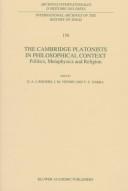| Listing 1 - 3 of 3 |
Sort by
|
Book
ISBN: 9789042934825 9042934824 Year: 2017 Volume: 62 Publisher: Leuven Peeters
Abstract | Keywords | Export | Availability | Bookmark
 Loading...
Loading...Choose an application
- Reference Manager
- EndNote
- RefWorks (Direct export to RefWorks)
John Smith (1618-1652), long known for the elegance of his prose and the breadth of his erudition, has been underappreciated as a philosophical theologian. This book redresses this by showing how the spiritual senses became an essential tool for responding to early modern developments in philosophy, science, and religion for Smith. Through a close reading of the Select Discourses (1660) it is shown how Smith's theories of theological knowledge, method, and prophecy as well as his prescriptive account of Christian piety rely on his spiritual aesthetics. Smith offers a coherent system with intellectual intuition informing natural theology and revelation supplemented by spiritual perception via the imagination too. The central uniting feature of Smith's philosophical theology is thus `spiritual sensation' broadly construed. The book closes with proposals for research on Smith's influence on the accounts of the spiritual senses developed by significant later figures including Jonathan Edwards (1703-1758) and John Wesley (1703-1791).
Cambridge Platonists --- Cambridge [Ecole platonicienne de ] --- Cambridge [Platonisten van ] --- Ecole platonicienne de Cambridge --- Platonisten van Cambridge --- Platonists [Cambridge ] --- Christian fundamental theology --- Smith, John --- Religion --- Philosophy --- History --- 17th century
Book
ISBN: 8820497581 9788820497583 Year: 1996 Volume: [46] Publisher: Milano : F Angeli,
Abstract | Keywords | Export | Availability | Bookmark
 Loading...
Loading...Choose an application
- Reference Manager
- EndNote
- RefWorks (Direct export to RefWorks)
Cambridge Platonists --- Cambridge [Ecole platonicienne de ] --- Cambridge [Platonisten van ] --- Ecole platonicienne de Cambridge --- Neoplatonism --- Neoplatonisme --- Néo-platonisme --- Philosophes du Portique --- Philosophes stoïciens --- Philosophie du Portique --- Philosophie stoïcienne --- Platonisten van Cambridge --- Platonists [Cambridge ] --- Portique (Philosophie grecque) --- Portique [Le ] (Ecole philosophique ancienne) --- Stoa (Filosofische school) --- Stoicism --- Stoics --- Stoïciens --- Stoïcijnen --- Stoïcisme --- Stoïcisme (Philosophie grecque) --- École du Portique --- École stoïcienne --- Platonists --- Philosophy, English --- Platoniciens de Cambridge --- Platoniciens --- Philosophie anglaise --- Congresses --- History --- Congrès --- Histoire --- Origen --- Influence --- Stoïcisme --- Congrès --- England --- Congresses. --- Cambridge Platonists - Congresses. --- Platonists - England - History - 17th century - Congresses. --- Stoics - Congresses.

ISBN: 0792345304 9048148448 940158933X 9780792345305 Year: 1997 Volume: 150 Publisher: Dordrecht ; Norwell, MA : Kluwer,
Abstract | Keywords | Export | Availability | Bookmark
 Loading...
Loading...Choose an application
- Reference Manager
- EndNote
- RefWorks (Direct export to RefWorks)
The Cambridge Platonists were defenders of tolerance in the political as well as the moral sphere ; they held that practical j u d g e m e n t came down in the last instance to individual conscience ; and they laid the foundations of our modern conceptions of conscience and liberty. But at the same time they ma intained the existence of eternal truths , and of a Good-in-itself , identical with Truth and Being, refusing to admit that freedom of conscience i m p li e d moral relativism. They were critics of dogmatism, and of the sectarian notion of "enthusiasm" as a source of illumination , on the grounds that both were disruptive of social harmony; they pleaded the cause of reason , in the hope that it could become the foundation of all human knowledge . Yet , for all that , they ma intained that a certain sort of mystical illumination lay at the heart of all true thought , and that human reason had validity only in virtue of i t s divine origin . They debated with Des cartes and took a keen interest in his mech- ism and his dualism ; they brought the atomistic theories of Democritus back into repute; and they sought to provide a detailed account of the causality link ing all phenomena.
Cambridge Platonists --- Cambridge [Ecole platonicienne de ] --- Cambridge [Platonisten van ] --- Ecole platonicienne de Cambridge --- Platonisten van Cambridge --- Platonists [Cambridge ] --- Philosophy, English --- Political science --- Metaphysics --- Religion --- Platoniciens de Cambridge --- Philosophie anglaise --- Science politique --- Métaphysique --- Philosophy --- History --- Philosophie --- Histoire --- England --- Angleterre --- Intellectual life --- Vie intellectuelle --- Cambridge Platonists. --- -English philosophy --- Philosophy, British --- Platonists --- -Intellectual life --- -Cambridge Platonists --- -England --- -Cambridge Platonists. --- Métaphysique --- -Angleterre --- Anglii︠a︡ --- Inghilterra --- Engeland --- Inglaterra --- Anglija --- Philosophy [English ] --- 17th century --- Philosophy. --- Modern philosophy. --- Ethics. --- Religion—Philosophy. --- Political philosophy. --- History of Philosophy. --- Modern Philosophy. --- Philosophy of Religion. --- Political Philosophy. --- Political philosophy --- Deontology --- Ethics, Primitive --- Ethology --- Moral philosophy --- Morality --- Morals --- Philosophy, Moral --- Science, Moral --- Values --- Modern philosophy --- Mental philosophy --- Humanities --- Philosophy, English - 17th century. --- Platonisme --- 17e siecle
| Listing 1 - 3 of 3 |
Sort by
|

 Search
Search Feedback
Feedback About UniCat
About UniCat  Help
Help News
News